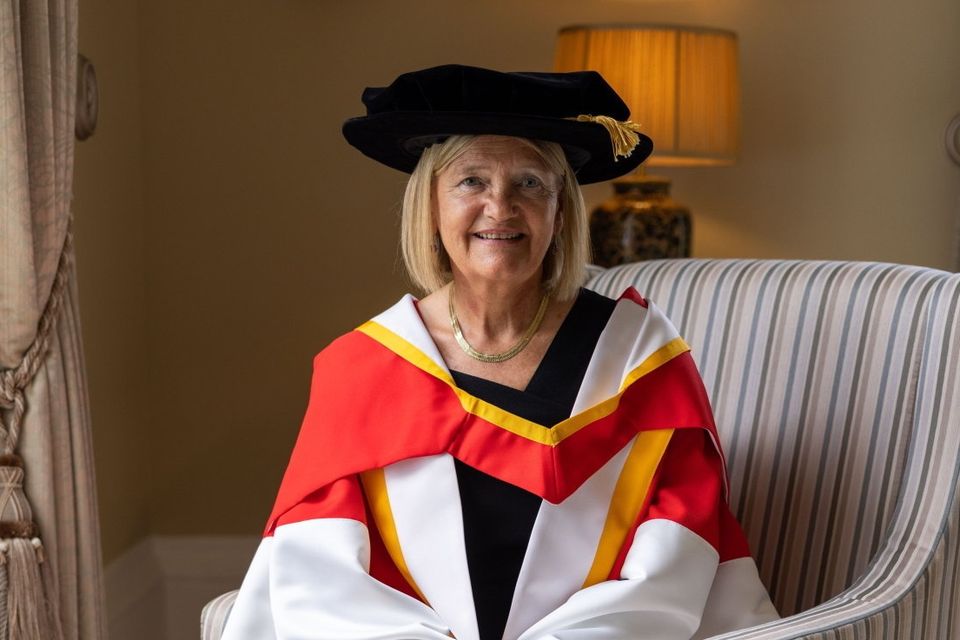University of Limerick chancellor became ‘alarmed and worried’ after review found it overpaid €5m for 20 homes
UL president Professor Kerstin Mey is currently out on sick leaveA review puts an average valuation of about €312,000 each on the 20 homes, about half the sum UL paidProfessor Brigid Laffan said there is a ‘very serious governance problem’ around the €11.44m acquisition of the houses.70+ lecturers express no confidence in UL president Kerstin Mey
Professor Brigid Laffan, University of Limerick chancellor. Picture: Sean Curtin/True Media
University of Limerick’s (UL) chancellor has told staff she became “extremely alarmed and worried” after a review questioned the college’s controversial purchase of 20 homes near its campus.
Professor Brigid Laffan said there is a “very serious governance problem” around the €11.44m acquisition of the houses.
A review of the purchase found UL overpaid for the properties to the tune of €5.2m. A stamp duty bill will bring the total outlay on the modest homes at Rhebogue, near UL’s campus, to €12,583,208 – about €629,000 each.
UL president Professor Kerstin Mey is currently out on sick leave. Her future leading the university has come under scrutiny because of the deal.
Professor Mey will not be appearing at a scheduled meeting with the Dáil’s Public Accounts Committee next month.
More than 70 lecturers, 10 members of the university’s executive and student representatives have written to Prof Mey saying she has lost their confidence.
Deputy President and Provost Prof Shane Kilcommins, a signatory to one of these letters, is “carrying out the business of the university” in the president’s absence, Prof Laffan told staff today.
Prof Laffan said UL would now be subjected to “extreme oversight” by the Higher Education Authority (HEA) because of questions surrounding the deal.
She said issues around the purchase first came to the governing authority’s attention in December. This was despite the deal being announced in 2022, and UL paying for the properties last October.
“Because of the unfortunate history of Dunnes Stores and the city centre campus, I and the governing authority decided very quickly to review what lay behind the capital acquisition of Rhebogue,” Prof Laffan said, citing another €8.3m property deal in 2019 which led to UL paying €3m than it should have for a former retail unit.
A review of the Rhebogue deal puts an average valuation of about €312,000 each on the 20 homes, about half the sum UL paid.
Students live in the homes, but UL does not have planning permission to use them as student housing.
The terms of reference for the review of the deal were finalised on February 18, a week after the Sunday Independent first published details of the deal.
This review examined issues around a stamp duty bill, planning permission at the site and whether the deal represents value for money and is currently being examined by UL’s governing authority – a board responsible for planning and policy at the university.
The HEA has ordered UL to conduct a separate review of the deal.
In a letter sent to Prof Laffan, the HEA said it has deep concerns around the governance and culture at UL. It has powers to restrict funding or appoint officers to manage the running of the university in cases where serious issues are raised about an institution.
Staff told Prof Laffan they were concerned future revenue streams could be impacted by the growing controversy, damaging research and other work. They told her of a growing anger on campus.
In a statement, a spokesman for UL's Governing Authority said the group considered the review findings.
"The governing authority has determined that certain university personnel should be afforded the opportunity to review its content and submit written observations on its findings," he added.
"Once responses have been received, the governing authority will meet to determine the appropriate next steps."
He said engagement with the HEA will continue to confirm the terms of reference of the review it sought.
The Irish Independent sought to contact Dr Mey for comment via the university.
Join the Irish Independent WhatsApp channel
Stay up to date with all the latest news















